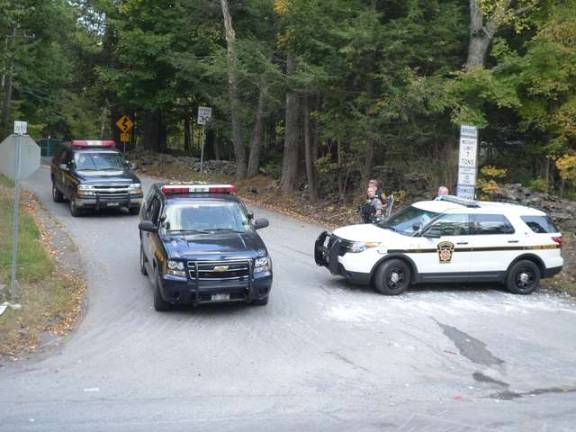Dispatcher who tried to save trooper sues state police for alleged rape

By Anya Tikka
MILFORD — Nicole Palmer, the dispatcher working in the Blooming Grove State Police barracks on the night two troopers were shot, has filed a civil lawsuit against nine officers and Pennsylvania State Police itself.
Attorneys Kevin Dempsey and Michel Gallacher filed the lawsuit on Palmer's behalf in Lackawanna County Court in Scranton on Feb. 28. It cites 10 separate counts of intimidation and sexual and other harassment during her time working in the barracks.
The litigation names former commissioner Frank Noonan, Pennsylvania State Commissioner Colonel Tyree Blocker, Sergeant Michael Brownmiller of Harrisburg, Lieutenant William Bowen of Harrisburg, Lieutenant Christopher Paris, Trooper Mark Pajalich, Trooper Brian Slovinski, and Lieutenant Craig Carey all of Dunmore as defendants, as well as Pennsylvania State Police.
Following Palmer’s filing, on March 3, the defendants’ counsel Kelly M. Neery, Senior Deputy Attorney General filed for removal of the case to US District Court for the Pennsylvania Middle District.
Calls for comment made to Trooper Mark Keyes, Pike County Community Services Officer, were not returned by press time.
One investigation leads to anotherThe lawsuit is related to the case against Eric Frein, the Canadensis man charged with ambushing the troopers in September 2014, killing one and critically injuring another. Frein's case will be tried in Pike County Court in Milford next month.
On the night of the shooting, according to the lawsuit, Palmer tried to drag Cpl. Bryon Dickson inside to safety after he fell. She was later interviewed as part of the investigation of the ambush.
She was asked if she knew of "any conduct relating to the PSP that might have served as motivating cause for the attacks upon the PSP,” and more specifically, if any personal, physical, or sexual relationship existed between Palmer and a certain trooper identified by the interviewer. Palmer responded that the trooper had raped her in the summer of 2013, and after that engaged in “numerous acts of inappropriate, unwelcome and sexually harassing and discriminatory behavior toward her at work.”
The trooper was at the time Palmer’s "de facto" supervisor, during her night duty.
According to the filing, the defendants didn’t want the rape allegation to be made public “due to concerns that the information would damage the reputation or public perception of the PSP, individual members, and/or the individual Trooper who had raped her."
At the time of the rape, Palmer reported the incident, but it was never investigated, according to the lawsuit. Instead, she came under investigation herself.
The lawsuit alleges the defendants orchestrated a systematic course of conduct to discredit and retaliate against her after she was interviewed as part of the shooting investigation.
Brownmiller and Bowen summoned Palmer to Harrisburg to discuss the case in November 2014, when they directed her not to talk about it, the suit says. No investigation of the trooper was conducted and no criminal charges brought after Palmer reported the rape. Police officials in Blooming Grove and Harrisburg did not want to look bad in the eyes of the public in the high-profile ambush shooting case, the suit says.
Forcible commitmentThe 77-page court document, which chronicles events starting with Palmer’s hiring in spring 2013, reads like a crime novel in places.
Palmer started working night duty in the fall of 2013, when problems started.
Among other allegations, the lawsuit says the police made up stories about Palmer, including that she’d refused a payment of $1 million to stay silent, resulting in an investigation. Also, the suit alleges, two of the accused troopers had her forcibly committed to a psychiatric institution, claiming that someone had reported she was suicidal. If she didn’t comply, they told her, she would be forcibly committed and her employment terminated. Her boyfriend, who was present at the time of the incident, said she was not suicidal. Palmer was released after an examination by the hospital psychiatrist, resulting in a charge of fake imprisonment.
Palmer filed for workers compensation. After the psychiatric evaluation, she was summoned to another meeting by the State Police in Bethlehem. According to her counsel, a police lieutenant said “We take care of our own" in response to a question about the reason for the alleged improper psychiatric conduct.
The defendants, extending from the Pennsylvania Police Commissioner and officers in charge of the barracks at the time, are also accused of violating Palmer’s constitutional rights of free speech, of creating a hostile working environment and companion retaliation as well as employment discrimination after she refused to give in. Other counts blame those in charge for not supervising properly.
It’s not clear at this time when hearings will take place.